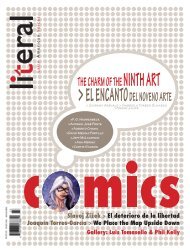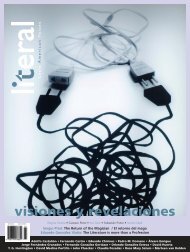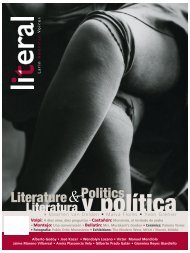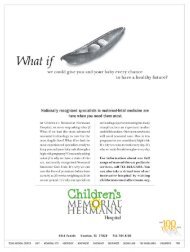Richard Serra - Literal
Richard Serra - Literal
Richard Serra - Literal
You also want an ePaper? Increase the reach of your titles
YUMPU automatically turns print PDFs into web optimized ePapers that Google loves.
Eso es lo que les permite ser moderados. Pero los<br />
musulmanes sí la tienen. Y esta relación acrítica con<br />
nuestras escrituras deviene en un complejo de superioridad.<br />
Este complejo de superioridad es peligroso por al<br />
menos dos razones: primero, otorga poder de manera<br />
desproporcionada a la fracción extrema y violenta del<br />
Islam. ¿Cómo? —y ésta es, al mismo tiempo, la segunda<br />
razón por la que esta visión acrítica es peligrosa—:<br />
inhibe al “centro razonable”, es decir, modera a este<br />
centro de cuestionar acerca de lo que pasa cuando la<br />
fe se convierte en dogma. Los jihadis son muy hábiles<br />
para citar al Corán y justifi car su violencia, y como el<br />
resto de nosotros hemos sido enseñados a no hacer<br />
preguntas sobre el Corán, nos quedamos con el sentimiento<br />
de que si cuestionamos al Corán, citando a<br />
los jihadis, equivale a desafi ar al Corán en sí mismo. Y<br />
eso, se nos dice, está fuera de lugar. Bienvenidos a la<br />
gran mentira que promueve el dogmatismo.<br />
El hecho es que aun dentro del Corán es permisible<br />
hacer preguntas sobre el Corán. Hace un tiempo<br />
el Islam creó una tradición gloriosa de pensamiento<br />
crítico, razonamiento independiente, debate y disentimiento<br />
conocido como “ijtihad”. Generó 135 escuelas<br />
de interpretación. Y enseñó a los musulmanes que<br />
podemos ser pensadores críticos y a la vez creyentes.<br />
Los musulmanes han dado la espalda a esta tradición.<br />
Si redescubrimos la ijtihad, no será por azar. Será por<br />
decisión propia.<br />
R.M.S.: Si como dices la jihad más importante es<br />
la autocrítica o la batalla interna con uno mismo (este<br />
concepto existe en otras religiones), ¿por qué continuar<br />
evitándola? ¿Será una cuestión de poder? ¿Sobrevivencia?<br />
¿Qué puede ser?<br />
I.M.: Comprometerse en una batalla consigo mismo<br />
es pelear con el orgullo propio, el ego, la estima<br />
y, fi nalmente, la identidad. En estos días la identidad<br />
se confunde con la integridad. Si nos identifi camos<br />
como musulmanes, que eso es todo lo que se supone<br />
que debemos ser, nuestros superiores, nos amenazan.<br />
Pertenecemos a cierta tribu con un particular juego de<br />
valores y desafi ar esos valores, aun si no los escogimos<br />
nosotros mismos, es traicionar a la gente que te dio tu<br />
identidad, en consecuencia, tu integridad. Es un argumento<br />
autónomo muy oportuno, ¿no es así?<br />
Este argumento, como cualquier dogma, alimenta<br />
el miedo —el miedo a quedar marginado o amenazado<br />
físicamente dentro de la propia comunidad; el miedo a<br />
ofender, instigado por un multiculturalismo ortodoxo;<br />
el miedo a perder el sentido de pertenencia, el cual es<br />
especialmente intimidante en un mundo en donde las<br />
fronteras se modifi can.<br />
Entonces ¿qué sustituye a la autocrítica? La autocensura.<br />
Muchos de nosotros nos encogemos y nos<br />
conformamos con las injusticias de nuestras propias<br />
tribus y los opresores a los que tememos, no necesitan<br />
8 4 L ITERAL. LATIN AMERICAN VOICES • FALL, 2007<br />
Moderate Christians, moderate Jews, moderate<br />
Hindus and moderate Buddhists do not have such an<br />
uncritical relationship to their scriptures. That’s what<br />
allows them to be moderate. But Muslims do. And<br />
this uncritical relationship to our scripture amounts to<br />
a supremacy complex about it.<br />
That supremacy complex is dangerous for at least<br />
two reasons. First, it disproportionately empowers the<br />
violent fringe in Islam. How? In the second way that<br />
this supremacy complex is dangerous: it inhibits the<br />
“reasonable center”—moderates—from asking hard<br />
questions about what happens when faith becomes<br />
dogma. The violent jihadis are so adroit at quoting from<br />
the Quran to justify their violence, and because the rest<br />
of us have been taught we cannot ask questions of the<br />
Quran, we are left with the feeling that challenging the<br />
Quran-quoting jihadis is to challenge the Quran itself.<br />
And that, we are told, is off-limits. Welcome to the big<br />
lie that dogmatism promotes.<br />
The fact is that even in Islam, it is permissible to ask<br />
questions of the Quran. Islam once exuded a glorious<br />
tradition of critical thinking, independent reasoning,<br />
debate and dissent known as “ijtihad.” It generated<br />
135 schools of interpretation. And it taught Muslims<br />
that we can be thoughtful and faithful at the same<br />
time. Muslims have turned their backs on this tradition.<br />
If we re-discover ijtihad, it will not be by chance. It will<br />
be by choice.<br />
R.M.S.: As you say, the most crucial jihad is self criticism<br />
or the struggle with one’s self (and this concept<br />
exists in many other religions), why keep avoiding it? Is<br />
it power, is it survival, what is it?<br />
I.M.: To engage in a struggle with the self is to contest<br />
one’s pride, ego, esteem—and ultimately, identity.<br />
These days, identity is confused with integrity. If we<br />
identify as Muslims than that is all we are supposed to<br />
be, the higher-ups warn us. We belong to a particular<br />
tribe with a particular set of values and to contest those<br />
values, even if we did not choose them for ourselves,<br />
is to betray the people who give you your identity and<br />
thus your integrity. A convenient, self-contained argument,<br />
is it not?<br />
This argument, like any dogma, feeds off fear—<br />
the fear of being marginalized or physically threatened<br />
within your community; the fear of offending, instilled<br />
by orthodox multiculturalism; the fear of losing a sense






